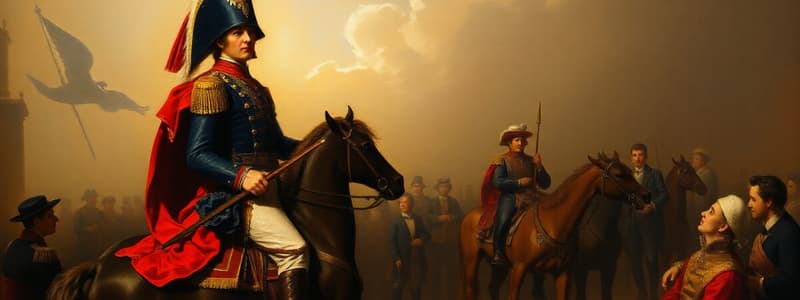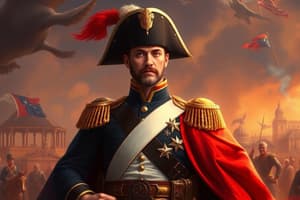Podcast
Questions and Answers
Napoleon Bonaparte was crowned emperor of France in the Cathedral of Notre Dame in 1804.
Napoleon Bonaparte was crowned emperor of France in the Cathedral of Notre Dame in 1804.
True (A)
The Confederation of the Rhine was formed after the defeat of Napoleon at the Battle of Austerlitz.
The Confederation of the Rhine was formed after the defeat of Napoleon at the Battle of Austerlitz.
False (B)
The Peninsular Wars took place between 1807 and 1814 when Napoleon attacked Spain and Portugal.
The Peninsular Wars took place between 1807 and 1814 when Napoleon attacked Spain and Portugal.
True (A)
Napoleon was defeated at the Battle of Trafalgar by Admiral Nelson in 1806.
Napoleon was defeated at the Battle of Trafalgar by Admiral Nelson in 1806.
The Confederation of the Rhine initially included 16 German states but later attracted 19 additional members.
The Confederation of the Rhine initially included 16 German states but later attracted 19 additional members.
Austria and Prussia were founding members of the Confederation of the Rhine.
Austria and Prussia were founding members of the Confederation of the Rhine.
Napoleon's invasion of Russia in 1812 was met with a successful strategy from the Russian troops.
Napoleon's invasion of Russia in 1812 was met with a successful strategy from the Russian troops.
Napoleon successfully defeated the Russians and secured a decisive victory at Moscow.
Napoleon successfully defeated the Russians and secured a decisive victory at Moscow.
The term 'Napoleon's Spanish Ulcer' refers to the initial victory he had over Spain and Portugal.
The term 'Napoleon's Spanish Ulcer' refers to the initial victory he had over Spain and Portugal.
The coalition that defeated Napoleon at Waterloo included England, Prussia, Russia, and Austria.
The coalition that defeated Napoleon at Waterloo included England, Prussia, Russia, and Austria.
Between 1801 and 1812, Napoleon managed to bring most of Europe under his rule.
Between 1801 and 1812, Napoleon managed to bring most of Europe under his rule.
The Continental Blockade was Napoleon's response to Britain's victory at the Battle of Austerlitz.
The Continental Blockade was Napoleon's response to Britain's victory at the Battle of Austerlitz.
Napoleon spent his last years in exile on the island of Elba.
Napoleon spent his last years in exile on the island of Elba.
The treatment of the pope by Napoleon gained him support among Catholics.
The treatment of the pope by Napoleon gained him support among Catholics.
Napoleon's forces were greatly diminished after the failed Russian campaign.
Napoleon's forces were greatly diminished after the failed Russian campaign.
Napoleon introduced the Code Napoleon in 1804, which was based on principles of the French Revolution.
Napoleon introduced the Code Napoleon in 1804, which was based on principles of the French Revolution.
Feudalism was abolished in France as a result of the French Revolution and Napoleon's rule.
Feudalism was abolished in France as a result of the French Revolution and Napoleon's rule.
Napoleon's vision included the creation of a unified European Empire.
Napoleon's vision included the creation of a unified European Empire.
The Code Napoleon became the basis for many modern Asian legal systems.
The Code Napoleon became the basis for many modern Asian legal systems.
Napoleon's rule did not significantly change the political landscape of Europe.
Napoleon's rule did not significantly change the political landscape of Europe.
What was the primary strategy employed by Russia during Napoleon's invasion in 1812?
What was the primary strategy employed by Russia during Napoleon's invasion in 1812?
What impact did the Confederation of the Rhine have on Germany?
What impact did the Confederation of the Rhine have on Germany?
What were the consequences of the Peninsular Wars for Napoleon's military forces?
What were the consequences of the Peninsular Wars for Napoleon's military forces?
How did Napoleon's Continental Blockade aim to weaken Britain?
How did Napoleon's Continental Blockade aim to weaken Britain?
Describe the result of the Battle of Austerlitz for Napoleon.
Describe the result of the Battle of Austerlitz for Napoleon.
What was the significance of Napoleon crowning himself emperor in 1804?
What was the significance of Napoleon crowning himself emperor in 1804?
What was Napoleon's role in the establishment of the Consulate?
What was Napoleon's role in the establishment of the Consulate?
What characterized Napoleon's military leadership style during his campaigns?
What characterized Napoleon's military leadership style during his campaigns?
What led to the defeat of Napoleon at the Battle of Trafalgar?
What led to the defeat of Napoleon at the Battle of Trafalgar?
What role did other European monarchies play in response to the French Revolution?
What role did other European monarchies play in response to the French Revolution?
What major event marked the beginning of Napoleon's decline?
What major event marked the beginning of Napoleon's decline?
How did the coalition opposing Napoleon change after his return from Elba?
How did the coalition opposing Napoleon change after his return from Elba?
What was one significant impact of Napoleon's rule on France's legal system?
What was one significant impact of Napoleon's rule on France's legal system?
What role did the Russian winter play in Napoleon's military campaign?
What role did the Russian winter play in Napoleon's military campaign?
What were the economic implications of feudalism's end in France during Napoleon's rule?
What were the economic implications of feudalism's end in France during Napoleon's rule?
What inspired Napoleon in his vision for a unified European Empire?
What inspired Napoleon in his vision for a unified European Empire?
What impact did Napoleon's treatment of the pope have on his support among the Catholic population?
What impact did Napoleon's treatment of the pope have on his support among the Catholic population?
What was the consequence of Napoleon's military campaigns on France's population?
What was the consequence of Napoleon's military campaigns on France's population?
How did the Battle of Waterloo contribute to Napoleon's final downfall?
How did the Battle of Waterloo contribute to Napoleon's final downfall?
What was a key reason for Russia's refusal to cooperate with Napoleon?
What was a key reason for Russia's refusal to cooperate with Napoleon?
Flashcards are hidden until you start studying
Study Notes
The Rise of Napoleon
- Monarchy abolished in France after the French Revolution, causing concern among European monarchies.
- Napoleon Bonaparte emerged as a military genius, leading the French army during the Revolution.
- Overthrew the Directory in 1799 and established the Consulate, becoming the first consul among three consuls.
- Crowned himself emperor in 1804 at Notre Dame in Paris, marking the foundation of the First French Empire.
Napoleon's Military Campaigns
- From 1801 to 1812, Napoleon expanded his rule over most of Europe, although he later lost many territories by 1815.
- In 1805, Admiral Nelson defeated Napoleon at the Battle of Trafalgar; in retaliation, Napoleon initiated the Continental Blockade in 1806.
The Confederation of the Rhine
- Defeated the Austrian-Russian alliance at the Battle of Austerlitz in 1806 and formed the Confederation of the Rhine.
- Initially included 16 German states, eventually growing to 35; Austria and Prussia opted out.
- Unified administration across the Confederation paved the way for future German unification.
The Peninsular Wars
- Napoleon invaded Spain and Portugal (1807-1814) due to their non-compliance with the Continental Blockade.
- This prolonged conflict drained resources and manpower, referred to as Napoleon's Spanish Ulcer.
The Russian Campaign
- In 1812, Napoleon invaded Russia with a vast army; Russians employed a scorched earth strategy.
- Faced with food shortages and winter conditions, the campaign ended disastrously for the French, with a significant loss of troops.
The Battle of Waterloo
- A coalition of England, Prussia, Russia, and Austria defeated Napoleon, leading to his exile to Elba.
- Napoleon escaped and ruled France for 100 days but suffered a decisive defeat at the Battle of Waterloo in 1815.
- Following the loss, he was imprisoned on Saint Helena, where he died in 1821.
Causes of Napoleon’s Downfall
- Military campaigns bred discontent, resulting in loss of life and financial strain on France.
- Hostile reactions initiated from the Catholic Church and dispossessed rulers diminished support.
- The failure of the Russian campaign severely tarnished his reputation and decreased his military capabilities.
Impact of Napoleon's Rule
- Napoleon aimed to create a unified European Empire and was inspired by historical figures like Alexander the Great.
- Implemented the Code Napoleon in 1804, promoting principles of liberty, equality, and fraternity across conquered territories.
- The new legal code contributed to unified administration and influenced modern European legal systems.
- Together with the French Revolution, Napoleon ended feudalism in France, abolishing noble and clerical privileges, thus promoting capitalism.
The Rise of Napoleon
- Monarchy abolished in France after the French Revolution, causing concern among European monarchies.
- Napoleon Bonaparte emerged as a military genius, leading the French army during the Revolution.
- Overthrew the Directory in 1799 and established the Consulate, becoming the first consul among three consuls.
- Crowned himself emperor in 1804 at Notre Dame in Paris, marking the foundation of the First French Empire.
Napoleon's Military Campaigns
- From 1801 to 1812, Napoleon expanded his rule over most of Europe, although he later lost many territories by 1815.
- In 1805, Admiral Nelson defeated Napoleon at the Battle of Trafalgar; in retaliation, Napoleon initiated the Continental Blockade in 1806.
The Confederation of the Rhine
- Defeated the Austrian-Russian alliance at the Battle of Austerlitz in 1806 and formed the Confederation of the Rhine.
- Initially included 16 German states, eventually growing to 35; Austria and Prussia opted out.
- Unified administration across the Confederation paved the way for future German unification.
The Peninsular Wars
- Napoleon invaded Spain and Portugal (1807-1814) due to their non-compliance with the Continental Blockade.
- This prolonged conflict drained resources and manpower, referred to as Napoleon's Spanish Ulcer.
The Russian Campaign
- In 1812, Napoleon invaded Russia with a vast army; Russians employed a scorched earth strategy.
- Faced with food shortages and winter conditions, the campaign ended disastrously for the French, with a significant loss of troops.
The Battle of Waterloo
- A coalition of England, Prussia, Russia, and Austria defeated Napoleon, leading to his exile to Elba.
- Napoleon escaped and ruled France for 100 days but suffered a decisive defeat at the Battle of Waterloo in 1815.
- Following the loss, he was imprisoned on Saint Helena, where he died in 1821.
Causes of Napoleon’s Downfall
- Military campaigns bred discontent, resulting in loss of life and financial strain on France.
- Hostile reactions initiated from the Catholic Church and dispossessed rulers diminished support.
- The failure of the Russian campaign severely tarnished his reputation and decreased his military capabilities.
Impact of Napoleon's Rule
- Napoleon aimed to create a unified European Empire and was inspired by historical figures like Alexander the Great.
- Implemented the Code Napoleon in 1804, promoting principles of liberty, equality, and fraternity across conquered territories.
- The new legal code contributed to unified administration and influenced modern European legal systems.
- Together with the French Revolution, Napoleon ended feudalism in France, abolishing noble and clerical privileges, thus promoting capitalism.
Studying That Suits You
Use AI to generate personalized quizzes and flashcards to suit your learning preferences.




